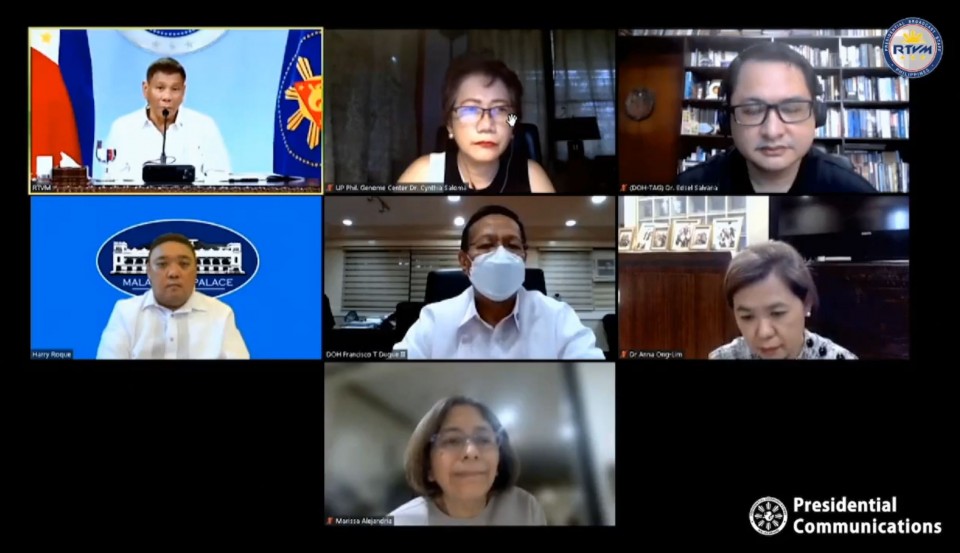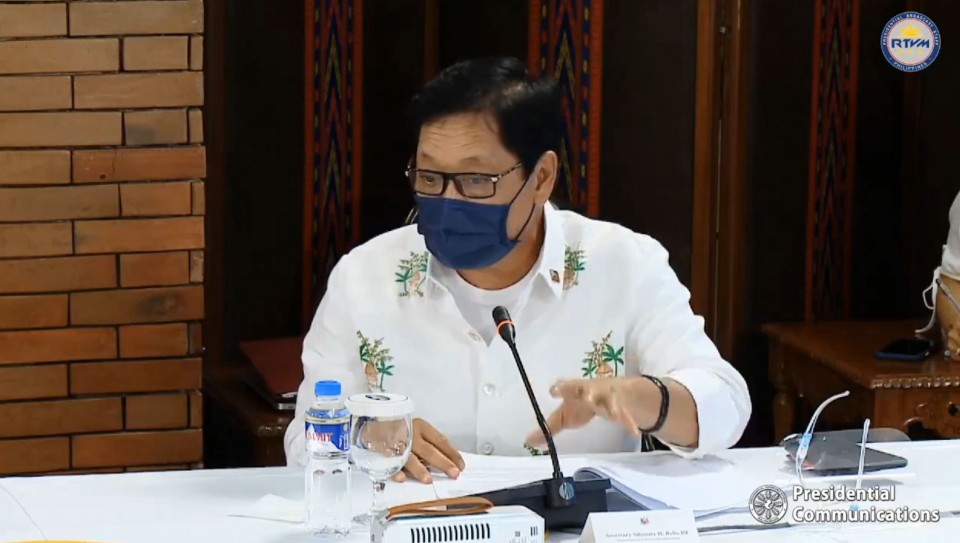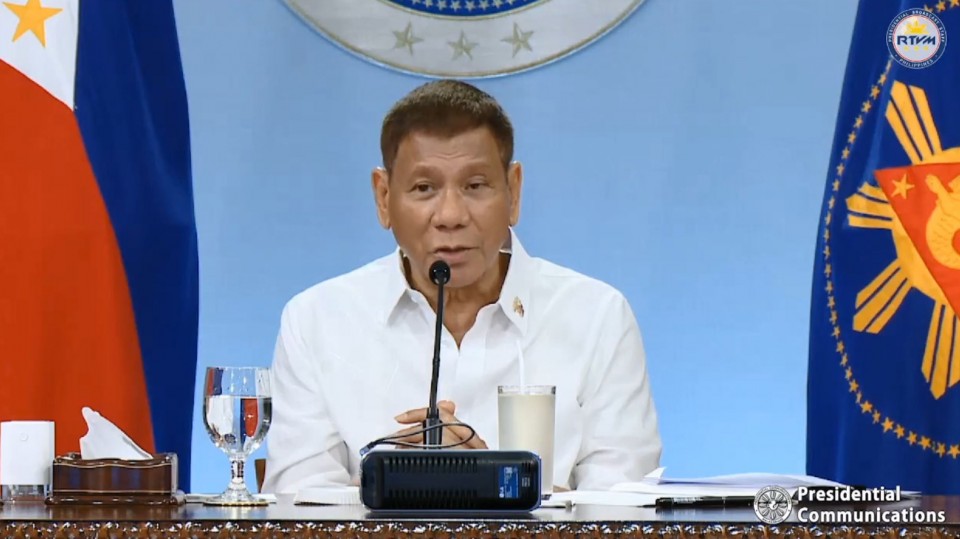Unscheduled meeting called to address DOLE chief Bello’s concerns on “too long” 14-day quarantine for OFWs

(Eagle News) – Health experts insisted on the value of a longer quarantine period for returning OFWs – from a minimum of 10 to 14 days –to protect the country from incoming variants of COVID-19 which President Rodrigo Duterte supported.
In a Talk to the Nation of President Duterte Wednesday night, April 21, specialist doctors who are members of the country’s Technical Advisory Group (TAG) noted how the 10 to 14 days of quarantine period is needed since a negative RT-PCR test upon arrival does not mean that a particular individual is free of the COVID-19 virus.
The meeting was not scheduled but President Duterte said he deemed it necessary to call the meeting amid the concern of Labor Secretary Silvestre Bello III that the quarantine for ROFs was too long. Bello was asking if this could be shortened citing funds that could be soon depleted for ROFs’ needs during the long quarantine stay.

“This meeting was called because of the complaint of — not really the complaint, but the misgivings of Secretary Bello of the dwindling funds of the OFW na which should only be spent for their care and needs,” Duterte explained on Wednesday night, April 21.
“So there was a bit of a discussion but I thought it wise to just maybe cut it and since this is a question of science and medical issue, it would be useless for us to be debating here and talking about these things. We will just invite the experts and — so that they can shed light, provide enlightenment to us and to the public why this is so,” he explained.
-Doctors point out some COVID-19 infected OFWs turn positive on 7th day-
The doctors noted that there are returning OFWs who test positive on the seventh day of quarantine period. They also said that the previous protocol of testing on the fifth day of quarantine, and letting the OFW go after a negative RT-PCR test does not apply for the current COVID-19 variants which had been studied to be far more infectious than the original variants.
“We know po that COVID, especially the variants of concern have come into the country through the different — through returning travelers po. And this is why it is really essential that we have some sort of control to prevent the entry of these variants of concern,” said Dr. Edsel Maurice Salvaña, director of the Institute of Molecular Biology and Biotechnology at the National Institutes of Health at the University of the Philippines Manila.
Dr. Salvaña said that the OFW could also get infected while on the plane, which means he could test negative upon arrival.
“If somebody gets infected in transit, on the plane, ‘pag tinest niyo po siya pagdating hindi pa po magpo-positive ‘yan. It usually takes three to five days for the person to turn positive on PCR,” he said.
Dr. Salvaña said that the two-week facility-based quarantine was the “most efficient way of controlling the entry” of the new virus variants.
“The problem is po it’s very expensive and was not sustainable and that is why we changed it in February,” he said.
-Cases missed: February revision in quarantine for OFWs contributed to surge-
“And when we changed it in February, the stipulation was five days and then test, and then the LGU should strictly monitor the completion of quarantine. And the advantage of this was less expensive and the testing on the fifth day is better than testing on arrival kasi again if you test on arrival, baka nagtatago pa ‘yong virus, hindi pa po siya magpo-positive,” he said.
But this was when there were cases that had been missed. That was the disadvantage, he said, because some tested positive on the seventh day.
“We did have some lapses kaya po kasama rin po doon sa ating surge ngayon nakita po natin kumalat nang kaunti ‘yong variants of concern,” he said.
He thus pointed out that COVID-19 RT-PCR tests have false negative results depending on the day when the person is tested.
Dr. Anna Ong-Lim, another TAG member, said that the group had met to discuss this before. She said that they thought that it is “more critical to focus on quarantine measures because this will ensure that any entry of variants from travelers can be better controlled.”
“This is really coming from the fact that tests always have a false negative rate and if we really want to secure our borders, then the only way to go is to implement quarantine strictly. Well, preferably for 14 days but at the minimum at least for 10 days po,” she told President Duterte.
The doctors said that they understood the concern and the physical, mental, and emotional burden brought about by the 14-day quarantine policy.
“However, we recognize also that the quarantine is really one way to prevent the spread of the virus,” said Dr. Marissa Alejandria, another member of the Technical Advisory Group for COVID-19.
-Pre-symptomatic phase contagious already-
Alejandria said that there is a pre-symptomatic phase where a person can infect others. She said that this is the basis for the 14 day quarantine period. The most infectious period is the first week, she said.
“But as mentioned by Dr. Salvaña and —we looked for new data ‘no, so there is data from CDC (Centers for Disease Control) and they did modeling studies also that the — we can reduce the quarantine period to 10 days ‘no from 14 days without testing and the residual ‘no transmission risk is just about one percent ‘no. It can go down to .1 to 10 percent,” she explained.
-Doctors: compromise of 10 day-quarantine period possible-
Alejandria said that this a “good compromise” – the reduction of the 14-day quarantine period to 10 days. In this way, she said, “we reduce the duration of the period of quarantine with minimal effect on the number of infections that we may miss out.”
But it is important she said that the OFW remain asymptomatic or without symptoms and they have to complete the quarantine period in the local government unit (LGU), at home, or at the temporary quarantine facility with strict implementation of protocols and monitoring.
“So we — the TAG experts now we concur that we can relax the 14 days to 10 days without testing as long as they remain asymptomatic and monitoring is strictly implemented,” she said.
“At any period that the traveler or the overseas Filipino worker gets symptoms during the 10-day, then testing should be done. So the system should be in place ‘no to be able to isolate once they get symptoms and they get tested,” she explained.
Dr. Cynthia Saloma, another TAG member and the head of the Philippine Genome Center, noted that other countries even have a quarantine period of 21 days or three weeks.
“At the very least po, Mr. President, we really have to enforce ‘yong strict quarantine ‘no. It could be 10 days. The most ideal is 14 days. In other countries, they even do it for 21 days,” she said.
She noted that if just one positive case is not detected or is missed, this would result in clusters of cases resulting later in surges. She also noted the warm and hospitable Filipino culture could make it difficult to implement proper health protocols in a home quarantine setup for returning OFWs. This is what happened with the UK variant, B.1.1.7, and the South African variant, B.1.357 she said.
“Alam niyo naman, President, kung iuwi natin sila sa mga bahay, alam mo naman tayong mga Pilipino, exuberant. Ang hirap-hirap talaga, magcha-chat talaga sa neighbor, mga kapatid, mga kaibigan. So kailangan din po na kahit doon, pauwiin man sila sa bahay nila o LGU man sila, we really need to enforce po ‘yong strict quarantine. Iyon lang po talaga ‘yong ating panlaban dito,” she said.
-Duterte: No compromise on this-

President Duterte for his part said that he is not willing to compromise on this since the health security of the country is at stake, and agreed with the doctors’ position.
“I cannot — I cannot compromise — there is no compromise here. Hindi ako magko-compromise. So — just an off the cuff statement before I — we make the final decision here. I cannot — I am not ready for a compromise here of about — lalo na ngayon,” he said.
“Iyong ibang sakit siguro, puwede pa ‘yong mga rabies-rabies diyan. Pero ito, eh talagang as you have said, it’s a “dapo dito, dapo doon.” And then you have the exponential problem now of how to take care of the Filipinos,” he added.
(Eagle News Service)








